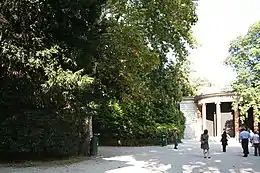
The French pavilion houses France's national representation during the Venice Biennale arts festivals.
Background
The Venice Biennale is an international art biennial exhibition held in Venice, Italy. Often described as "the Olympics of the art world", the Biennale is a prestigious event for contemporary artists known for propelling career visibility. The festival has become a constellation of shows: a central exhibition curated by that year's artistic director, national pavilions hosted by individual nations, as well as independent exhibitions throughout Venice. The Biennale parent organisation also hosts regular festivals in other arts: architecture, dance, film, music, theatre.[1]
Outside of the central, international exhibition, individual nations produce their own shows, known as pavilions, as their national representation. Nations that own their pavilion buildings, such as the 30 housed on the Giardini, are responsible for their own upkeep and construction costs as well. Nations without dedicated buildings create pavilions in venues throughout the city.[1]
Organisation and building
The pavilion was built in 1912 and designed by architect Faust Finzi, chief engineer for the Venice municipality. Its layout and details are similar to that of the German pavilion, whose architect was Finzi's former boss.[2]
Representation by year
Art
- 1962 — Alfred Manessier, Jean Messagier, Serge Poliakoff, André Marfaing, James Guitet
- 1976 — Herve Fisher, Fred Forest, Raymond Hains, Alain Jacquet, Bertrand Lavier, Jean-Pierre Raynaud, Jean-Michel Sanejouand, Jean-Paul Thenot (Commissioner: Pierre Restany)
- 1982 — Simon Hantaï
- 1984 — Jean Dubuffet
- 1986 — Daniel Buren[3]
- 1991 — Jean Nouvel, Christian de Portzamparc, Philippe Starck
- 1993 — Jean-Pierre Raynaud
- 1995 — César
- 1997 — Fabrice Hybert
- 1999 — Huang Yong Ping, Jean-Pierre Bertrand
- 2001 — Pierre Huyghe
- 2003 — Jean-Marc Bustamante (Curators: Jean-Pierre Criqui, Alfred Pacquement)
- 2005 — Annette Messager (Curator: Caroline Ferreira)
- 2007 — Sophie Calle (Curator: Daniel Buren)[4]
- 2009 — Claude Lévêque (Curator: Christian Bernard)
- 2011 — Christian Boltanski (Curator: Jean-Hubert Martin)
- 2013 — Anri Sala (Curator: Christine Macel) [Exhibition was held at the German pavilion]
- 2015 — Céleste Boursier-Mougenot, Lili Reynaud-Dewar (Curator: Emma Lavigne)[5]
- 2017 — Xavier Veilhan (Curators: Lionel Bovier, Christian Marclay)
- 2019 — Laure Prouvost (Curator: Martha Kirszenbaum)[6]
- 2021 — Zineb Sedira[7]
- 2024 — Julien Creuzet[8]
References
- 1 2 Russeth 2019.
- ↑ Volpi 2013.
- ↑ Michael Brenson (July 1, 1986), Biggest Biennale, The 42, Opens In Venice New York Times.
- ↑ Louise Neri (March 7, 2009), Sophie Calle Interview.
- ↑ Victoria Stapley-Brown (May 22, 2014), Céleste Boursier-Mougenot to represent France at Venice Biennale Archived 2014-05-22 at the Wayback Machine The Art Newspaper.
- ↑ Nina Siegal (June 7, 2019), Laure Prouvost Represents France. But She Doesn’t Feel Very French. New York Times.
- ↑ Gareth Harris (January 27, 2020), Zineb Sedira to represent France at 2021 Venice Biennale The Art Newspaper.
- ↑ Alex Greenberger (8 December 2022), Julien Creuzet to Represent France at the 2024 Venice Biennale ARTnews.
Bibliography
- Russeth, Andrew (April 17, 2019). "The Venice Biennale: Everything You Could Ever Want to Know". ARTnews. Retrieved April 22, 2019.
- Volpi, Cristiana (2013). "France". In Re Rebaudengo, Adele (ed.). Pavilions and Garden of Venice Biennale. Rome: Contrasto. p. 169. ISBN 978-88-6965-440-4.
Further reading
- Russeth, Andrew (May 21, 2018). "France Picks Laure Prouvost for 2019 Venice Biennale Pavilion". ARTnews. Retrieved June 19, 2018.
- Kenedy, R. C. (November 1973). "Gerard Titus-Carmel". Art International (Archive Press). 17: 16. ISSN 0004-3230 – via EBSCOhost.